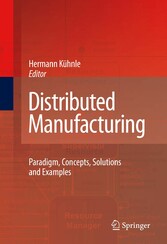Suchen und Finden

Distributed Manufacturing - Paradigm, Concepts, Solutions and Examples
Changing world market conditions have forced manufacturers to apply new architectures and technologies for the design and control of manufacturing systems. Distributed Manufacturing: Paradigm, Concepts, Solutions and Examples outlines the current requirements of manufacturing systems and addresses the architectures, methodologies, and technologies developed within European research activities in response to these requirements.
Distributed Manufacturing: Paradigm, Concepts, Solutions and Examples will be of interest to researchers and developers in all fields involving industrial control systems, as well as to decision-makers within industry and government organizations. The reader will gain a detailed knowledge of the current research directions in industrial control, reaching a comprehensive understanding of current advances, their expected benefits and limitations, and the possible consequences for industrial businesses.
Hermann Kühnle holds a doctorate in Mechanical Engineering and a diploma in Mathematics, both from the University of Stuttgart. He joined the Otto-von-Guericke-University of Magdeburg, Germany, in 1994 as a Full University Professor and as Executive Director of the Institute for Ergonomics, Manufacturing Systems and Automation. From 1994 to 2001 he was also Foundation and Executive Director of the Fraunhofer Institute for Factory Operation and Automation, IFF, Magdeburg.
Alle Preise verstehen sich inklusive der gesetzlichen MwSt.



















